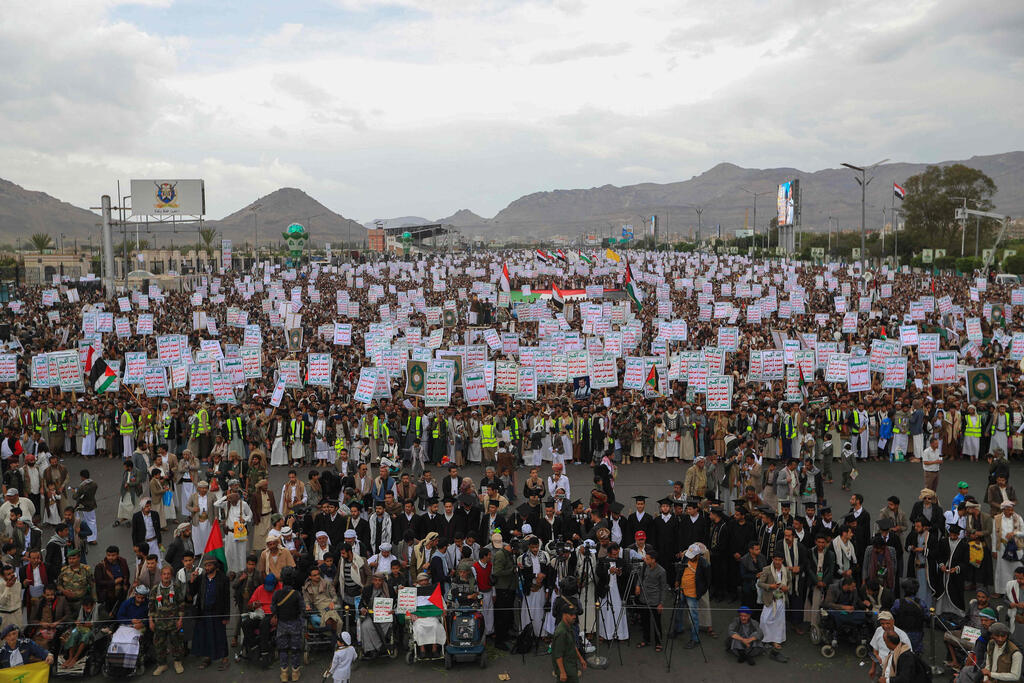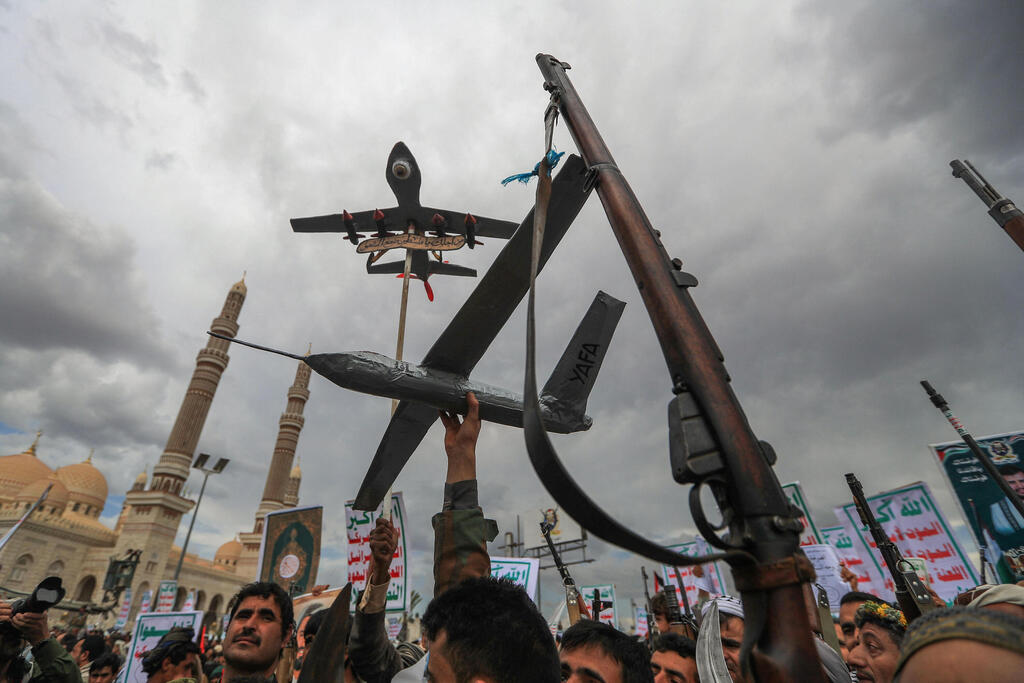Despite a month and a half of heavy air and naval bombardment by the United States and, more recently, Britain, Yemen’s Houthi rebels launched four separate attacks against Israel within a single day, underscoring the group's continued operational capacity and defiance.
The Iran-backed terrorist group, which controls northwestern Yemen, has maintained pressure on Israel and its allies, triggering repeated missile alerts across the country in recent weeks. Some projectiles have been intercepted without sirens being activated, highlighting the ongoing challenge to Israel’s air defenses.
Aftermath of US airstrike on Ras Issa Port in Yemen's Houthi-controlled Hodeidah province
The Red Sea blockade imposed by the Houthis also remains in place, inflicting significant economic harm on both Israel and Egypt. As the conflict drags on, international observers have begun to question whether the current U.S.-led air campaign is sufficient—or whether only a broader ground operation will ultimately bring the Houthis to heel.
Since the start of the latest campaign overnight on March 15–16, the Trump administration has launched twice as many airstrikes as the Biden administration did over a 13-month period. According to U.S. Central Command, the operation has targeted over 800 Houthi sites, killing hundreds of fighters, including senior figures.
The Pentagon claims the strikes have had tangible effects: ballistic missile launches by the Houthis have dropped by 69 percent, while drone attacks have declined by 55 percent. The Armed Conflict Location & Event Data Project (ACLED) reported at least 351 U.S. strikes over six weeks—America’s highest monthly total since 2017.
Yet the campaign’s main objective—halting Houthi aggression toward Israel and securing Red Sea shipping lanes—has not been achieved.
According to The Financial Times, the U.S. is still grappling with a dilemma that eluded President Joe Biden and even Saudi Arabia before him: how to significantly degrade Houthi military capabilities and end the attacks without being drawn into a costly, protracted war with no clear endgame.
Though U.S. strikes have forced the rebel group’s senior leadership into hiding and reportedly destroyed critical infrastructure and weapons depots, Houthi forces continue to stage weekly rallies in Sanaa, showcasing anti-Israel and anti-American sentiment. The group has also managed to inflict damage on U.S. forces, albeit limited. In one recent incident, an American F-18 fighter jet plunged into the sea from the USS Harry S. Truman as its crew attempted to evade a Houthi attack.
“I haven’t seen an ability to make the Houthis desperate for a pause,” Jon Alterman of the Center for Strategic and International Studies told the Financial Times. “When I’ve spoken with people in the U.S. government, many seem consistently baffled by the Houthi calculus.”
According to Alterman, one of the core challenges is that the Houthis derive their legitimacy, in part, from opposition to the United States. They also have a “lot of patience,” he added.
Under the Biden administration, the U.S. also attempted to deter the Houthis through airstrikes, albeit at a slower pace. But the group, hardened by years of Saudi bombardment and fortified by an extensive network of tunnels and bunkers in Yemen’s northern mountains, remained largely undeterred.
Former U.S. ambassador Dan Shapiro, who served in the Biden administration, said officials eventually concluded that “probably we’re going to need to kill some Houthi leaders to change their policy.” However, he noted that such a move raised political concerns about implicitly supporting rival Yemeni factions—something the administration was reluctant to do.
In recent weeks, Houthi missile and drone attacks have reached nearly every region of Israel. According to Ynet military analyst Ron Ben-Yishai, the uptick in attacks stems from two key developments.
First, U.S. intelligence capabilities have significantly improved during the six-week air campaign, allowing for more precise targeting of Houthi arms depots and launch sites. Israel believes the U.S. is now effectively striking not just weapon storage facilities but also operational sites used to launch missiles and drones across western and central Yemen.
Second, U.S. forces have successfully disrupted Iran’s supply lines, making it harder for the Houthis to receive new weapons. As a result, analysts say, the Houthis are accelerating their launches—firing off drones and missiles before their caches can be destroyed.
Mirroring Hamas tactics in Gaza, the Houthis are also adjusting the timing of their attacks, launching during daylight hours when the visibility of missile flashes makes it harder for American aircraft to detect and target them with precision.
Only a ground offensive
The escalation in Houthi attacks on Israel and Red Sea shipping came shortly after the end of the most recent ceasefire in Gaza, which until then had coincided with a lull in Houthi operations.
Former Pentagon official Dana Stroul described the current U.S. operation as “the most significant sustained air campaign the U.S. military has carried out since the height of the ‘defeat ISIS’ war more than a decade ago.”
While the barrage of airstrikes may be taking a toll on the Houthis, speculation has mounted about whether anti-Houthi factions—or even Yemen’s internationally recognized government—will attempt to seize the opportunity to launch a renewed ground offensive. Such an operation could reignite the civil war that was effectively frozen in 2022 following a truce between the Houthis and Saudi Arabia.
However, two senior Yemeni officials from anti-Houthi camps told the Financial Times that while discussions have taken place with the U.S., there are no immediate plans for a ground operation. They cited not only strategic hesitation but also the devastating humanitarian consequences such an escalation could bring in war-ravaged Yemen, where life expectancy hovers around 63.
“We’re telling them to achieve their objectives; there needs to be something on the ground and the region [Saudi Arabia and the UAE] has to be involved,” one official said. “But there’s still skepticism.” With Riyadh and Abu Dhabi publicly denying involvement in any renewed offensive—after years of costly entanglement—Yemeni leadership appears paralyzed. “Everyone is waiting for the other one to move,” the official added.
Meanwhile, Yemen’s Prime Minister Ahmed Awad bin Mubarak announced his resignation. In a statement posted on X (formerly Twitter), he cited “many difficulties,” including the inability to effectively organize the government. “I just concluded a meeting with the chairman of the Presidential Leadership Council, Rashad al-Alimi, and submitted my resignation as prime minister,” he wrote. “I pray my successor will succeed and call on everyone to unite and support him in these difficult times.”
Farea al-Muslimi, a researcher at Chatham House in London, said the Houthis could be seriously weakened by a combined air-and-ground campaign involving southern Yemeni factions. But such an effort would require close coordination among the U.S., Saudi Arabia, the UAE and groups that have failed to oust the Houthis for nearly a decade.
“You have a lot of people dealing with the war as if they’ve learned nothing from 2015 [when Saudi Arabia intervened], as if this is going to be easy, and I’m not full of that wishful thinking,” al-Muslimi told the Financial Times. “The Houthis have a PhD in being incognito and no matter how heavy the airstrikes, it’s not going to make much difference on its own.”
With the campaign’s endgame unclear, questions remain about the long-term effectiveness of the U.S. effort. Shapiro noted that while the Biden administration’s earlier strikes destroyed hundreds of weapons depots, “at the end of the day, they have many more than hundreds, and they can keep building." “They’ve got an indigenous capability and they are still smuggling” from Iran, said Shapiro.
The U.S. recently issued direct warnings to Iran, vowing to respond “at the time and place of our choosing” over its continued support for the Houthis.
Stroul also cautioned about the toll the Red Sea campaign is taking on American military readiness. “They’ve pulled so much out of the Asia-Pacific theatre for this campaign in the Red Sea,” she said. "So, how long are they willing to go on, and where’s the pain point for them?
Jerusalem and Cairo losing patience
Israel has opted not to respond militarily to recent Houthi attacks, relying instead on the ongoing U.S.-led campaign in Yemen, officials said this week. According to Israeli defense sources, Washington’s intensive air campaign has significantly degraded the Iran-backed group's capabilities, making Israeli intervention unnecessary for now.
Get the Ynetnews app on your smartphone: Google Play: https://bit.ly/4eJ37pE | Apple App Store: https://bit.ly/3ZL7iNv
“The fact that they’re still firing doesn’t mean much,” a senior Israeli security official told Ynet earlier this week. “The American operation is very effective. The Houthis still have launch capabilities, but they’re struggling to launch in significant numbers. Most of the missiles are intercepted or fall short—right now, the Houthi threat to Israel is more of a nuisance than a strategic danger.”
The official added that it’s difficult to predict when the threat from Yemen will disappear entirely, but emphasized the need for patience. “The Americans are doing a good job there. There’s nothing we could add in terms of offensive capabilities,” he said. Another Israeli source noted, “Every day during the past six weeks, the U.S. has carried out roughly ten times more strikes than we could execute in Yemen in an entire year.”
An Israeli interceptor launched at an incoming Houthi missile
As the military campaign continues, Egypt faces steep economic fallout from the Houthi disruption of Red Sea shipping routes. The sharp decline in traffic through the Suez Canal has cost Cairo an estimated $800 million in monthly revenue. Tensions between Egypt and Washington flared recently when President Donald Trump publicly called on Cairo to grant the U.S. free passage through the canal, arguing that “America is protecting it.”
From Jerusalem’s perspective, the broader concern is not only the immediate threat of Houthi missile fire, but the group’s growing reach. Israeli officials have been monitoring Houthi attempts to expand their presence into the Horn of Africa, geographically drawing closer to Israel.
Danny Citrinowicz, a research fellow at the Institute for National Security Studies (INSS) and former head of the Iran branch in IDF Military Intelligence, warned earlier this month that the ideological fervor driving the Houthis to target Israel would not easily be diminished.
“Eventually, there may be no choice but to bring down the Houthi regime,” Citrinowicz said. “The U.S. strikes are doing good tactical work, but they’re not building long-term deterrence. The Houthis may be hurt, but their motivation to act is stronger than ever.”











